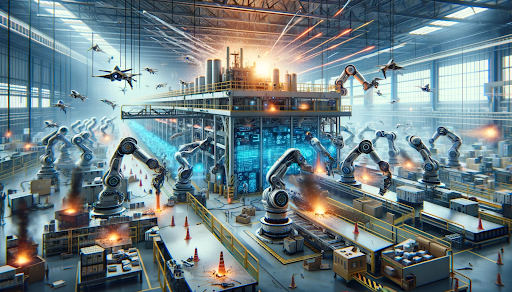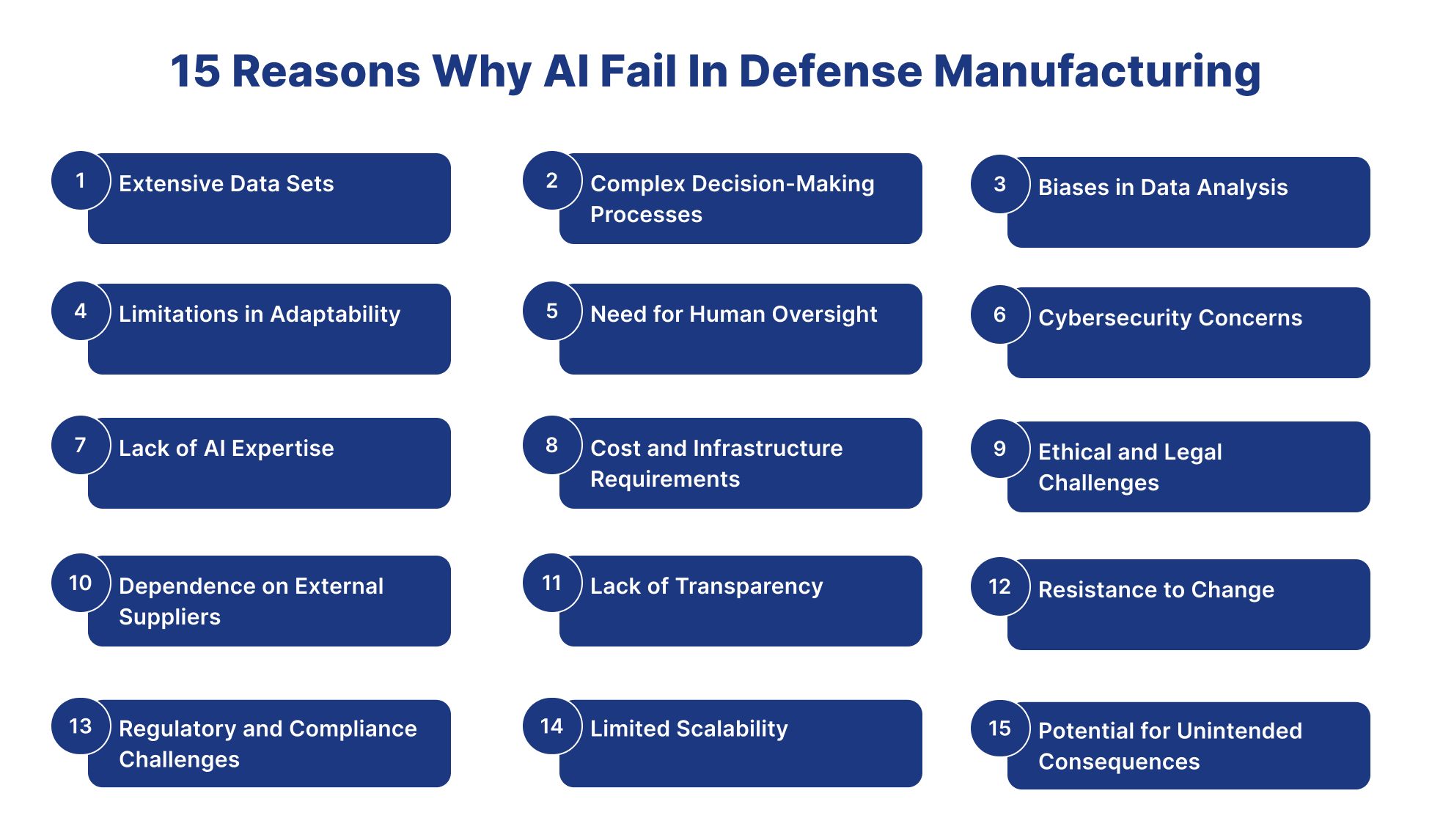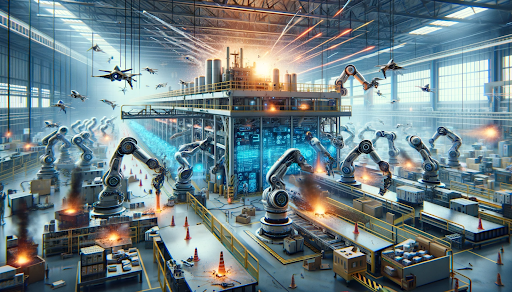15 reasons why AI fails in defense manufacturing
Posted by Hitul Mistry
/20 Jan 24
Tagged under: #ai,#aifails,#defensemanufacturing
However, despite its potential benefits, AI fails in defense manufacturing for various reasons
Introduction
- Artificial intelligence (AI) has been a key technical advance in several industries, including defense manufacturing. The use of artificial intelligence (AI) in defense production processes holds the possibility of enhanced efficiency, accuracy, and overall improvement. However, despite its potential benefits, AI fails in defense manufacturing for various reasons. In this introduction, we will look at a few significant factors that might stymie the practical application of AI in the defense industry, highlighting the challenges and potential constraints.

- In the following discussion, we will look at the difficulties and limits of AI in defense production. These factors include the necessity for large data sets, complicated decision-making procedures, the possibility of biases, adaptation constraints, and the requirement for human oversight. By investigating these variables, we want to provide complete knowledge of why AI may confront obstacles and constraints in defense production.
15 reasons why AI fail in defense manufacturing

1.Extensive Data Sets:
- The requirement for large data volumes is one of the critical reasons for AI failure in defense production. AI models learn, analyze, and make judgments using massive data. In particular, high-quality data is required for AI models to function well in the defense industry. Unfortunately, getting big and reliable data sets can be difficult because sensitive data linked to national security is frequently involved in defense production. Because of this reason, AI fails in defense manufacturing.
2.Complex Decision-Making Processes:
- Another critical problem that AI faces in defense production is complex decision-making. While decision-making in the production process may be automated in many circumstances, AI must still evaluate several criteria. For example, materials, designs, and tolerances are crucial in creating long-lasting military equipment. Because of this reason, AI fails in defense manufacturing.
3.Biases in Data Analysis:
- One of the most severe issues about the employment of AI in defense production is the possibility of bias in data analysis. Bias in the data utilized to train the AI model might result in skewed findings or suggestions. Any biased outcomes have serious ramifications, especially when working with sensitive and sophisticated industrial processes in the defense sector. Because of this reason, AI fails in defense manufacturing.
4.Limitations in Adaptability:

- Any defense manufacturing process must be able to adapt to rapid environmental changes. Humans are present in traditional production processes to monitor and make modifications as needed. However, AI models may be unable to adapt or make essential modifications independently, potentially resulting in quality and efficiency difficulties in production. Because of this reason, AI fails in defense manufacturing.
5.Need for Human Oversight:
- Despite breakthroughs in AI technology, human control is still required in defense production. Humans are required to ensure the correctness of equipment and procedures. They can tackle jobs that AI cannot undertake and make appropriate improvements as needed. Because of this reason, AI fails in defense manufacturing.
6.Cybersecurity Concerns :
- AI use in defense production raises possible cybersecurity risks. Any compromise or manipulation of AI systems can have serious implications for national security since it might provide enemies access to vital defense-related information or the potential to disrupt manufacturing operations. Because of this reason, AI fails in defense manufacturing.
7.Lack of AI Expertise:
- A high degree of competence in AI technology and its applications is required to use AI in defense production successfully. However, the defense sector may suffer a skills and knowledge shortfall in developing, deploying, and maintaining AI systems. Inadequate competence can lead to poor deployment, insufficient risk assessment, or inability to use AI's potential fully. Because of this reason, AI fails in defense manufacturing.
8.Cost and Infrastructure Requirements:
- Integrating artificial intelligence into defense production may be expensive, both in terms of purchasing AI systems and updating current infrastructure. The investment necessary for sophisticated AI technologies and the requirement for high-performance computer resources and infrastructure improvements can be substantial impediments for defense manufacturers, particularly those with low resources. Because of this reason, AI fails in defense manufacturing.
9.Ethical and Legal Challenges:
- Artificial intelligence (AI) systems in defense production must comply with ethical norms and regulatory frameworks. Ensuring AI-powered robots meet engagement standards and international humanitarian laws can be challenging. Furthermore, regarding human life and safety, AI decision-making poses ethical difficulties since responsibility and culpability become crucial considerations. Because of this reason, AI fails in defense manufacturing.
10.Dependence on External Suppliers:
- Many defense manufacturers rely on third-party suppliers for components and raw materials. AI systems may require interoperability or compatibility with suppliers' current systems to facilitate smooth integration. However, suppliers may have differing levels of AI competence or data access, obstructing the harmonization of AI-driven processes throughout the defense manufacturing supply chain. Because of this reason, AI fails in defense manufacturing.
11.Lack of Transparency :
- AI systems frequently operate as black boxes, making their decision-making processes challenging to explain or comprehend. This lack of openness can make identifying and correcting flaws or biases during the production process difficult. Furthermore, a lack of transparency might damage trust in AI-driven systems in the defense industry, where accountability and traceability are critical. Because of this reason, AI fails in defense manufacturing.
12.Resistance to Change:
- AI implementation in defense production necessitates significantly modifying existing processes, workflows, and worker responsibilities. Employee, management, and stakeholder resistance to change can stymie AI's successful adoption and integration. Robust change management methods, clear communication, and ensuring that staff realize AI's benefits and possibilities to the defense manufacturing industry are required to overcome reluctance. Because of this reason, AI fails in defense manufacturing.
13.Regulatory and Compliance Challenges:
- The defense sector is subject to many regulatory and compliance frameworks that must be properly followed. Integrating artificial intelligence into defense production necessitates negotiating these rules to maintain compliance. This involves ensuring that AI systems follow export control policies, guidelines for using sensitive or classified information, and industry-specific legislation, certifications, and standards. Because of this reason, AI fails in defense manufacturing.
14.Limited Scalability :
- Scalability issues may arise for AI systems used in defense production. While AI may excel at some jobs or circumstances, extending its skills across diverse products, production sites, or operational settings can be difficult. It is critical for effective deployment to ensure that AI systems can manage changing complexities and demands across diverse manufacturing scenarios. Because of this reason, AI fails in defense manufacturing.
15.Potential for Unintended Consequences:
- AI implementation in defense production processes may have unforeseen repercussions. As AI systems grow increasingly self-sufficient, there is a danger of unanticipated abnormalities, cascading mistakes, or unintentional interactions with other systems or equipment. To reduce possible hazards and guarantee safe and dependable operations, rigorous testing, validation, and constant monitoring are required. Because of this reason, AI fails in defense manufacturing.
Conclusion
-
Finally, prospective AI fails in defense manufacturing. Highlight the complex hurdles and diverse nature of incorporating sophisticated technology into such vital sectors. The intricacy of military operations and worries about the dependability and resilience of AI systems underscores the importance of exercising caution while using these technologies. AI's lack of explainability and openness in decision-making processes and data security and privacy concerns add to the concerns about AI applications in defense production.
-
Furthermore, the high cost and resource requirements and the integration issues with legacy systems provide substantial impediments that must be carefully navigated. The ethical and legal issues surrounding artificial intelligence, particularly in the context of autonomous weaponry and crucial decision-making, need the adoption of explicit frameworks and international standards.
How Digiqt will help you to adapt AI in your company
-
At Digiqt, we are dedicated to assisting companies in automating critical processes. Our highly skilled and professional team ensures the timely development and delivery of AI software. We commence by thoroughly understanding our client's specific requirements, and based on these requirements, our proficient team develops the AI software. Furthermore, we provide our clients with monthly updates on the software development progress.
-
Digiqt's commitment to automation, client-centric software development, and regular updates ensures efficiency and effectiveness in streamlining insurance operations.
Contact Us
About Us
We are a trusted, quality driven and value-driven digital product development company delivering services in BFSI sector.
Digiqt Technolabs is a passion turned into a company. We are a trusted product development company that specializes in turning your ideas into digital solutions utilizing our years of experience in industry-leading technologies.
We deliver high-tech innovations and great solutions for our clients in the most efficient manner regardless of the project complexity.
We are trusted, quality-driven and value-driven product development company.

Our key clients
Companies we are associated with
Our Offices

Ahmedabad
706,31FIVE Building,opp.Palladium, Corporate Rd, Makarba, Ahmedabad, Gujarat.
+91 99747 29554

Mumbai
WeWork, Enam Sambhav C-20, G Block,Bandra- Kurla Complex, MUMBAI-400051, Maharashtra.
+91 99747 29554

Stockholm
Bäverbäcksgränd 10 12462 Bandhagen, Stockholm, Sweden.
+46 72789 9039












